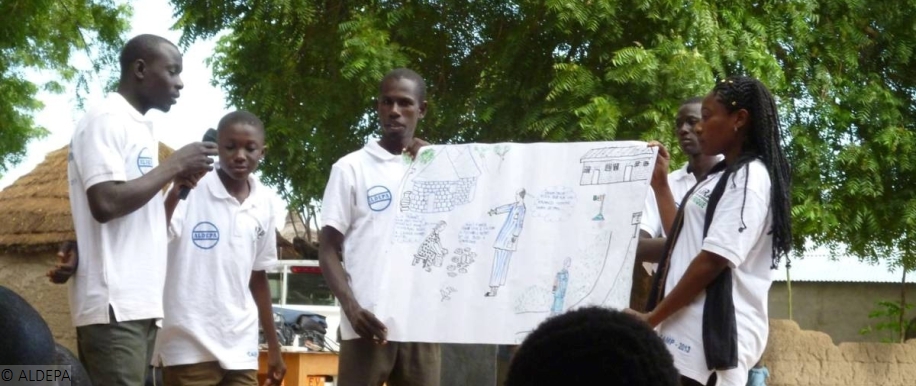Children and youth participation in the process for peace and political stability in Cameroon
The Far North Region of Cameroon – traditionally a peaceful region, where people of different origin, linguistic and cultural heritage as well as religious backgrounds have shaped a harmonic community – has recently seen a rise in insecurity, political instability, social and inter-religious mistrust as well as economic hardships and fear due to the terrorist activities of Boko Haram from Nigeria. This situation has devastating effects on the children of the region and their basic human and children’s rights.
For example, terrorist groups recruit children for suicide attacks. Besides, women and girls are increasingly suppressed and deprived of their basic liberties such as movement, play and education. Additionally, increased poverty (due to restrictions of economic activity) fosters phenomena like withdrawal from school, early and forced child marriage, (sexual) violence, neglect, child trafficking and economic exploitation of children. Civil society counter-initiatives to strenthen social cohesion in the communities and peaceful dialog are rare. There are currently few occasions on which children actively become involved in community and political life and few civil society initiatives including the participation of children and youth.
The project therefore aims at empowering children and youth groups to participate in processes of political stabilization and shaping a peaceful society. They are supported in initiating activities to enhance dialogue, at developing and establishing peaceful methods of conflict resolution. Besides the active participation of children and youth, mistrust, frustration and misunderstandings in society shall be diminished. Rather, dialogue is fostered between children and adults, men and women, different religious groups etc. in order to strengthen mutual trust and understanding as a solid ground for the shaping of peace.
The project shall enable young people to take an active part in political life, develop responsible leadership capabilities, initiate actions to promote peace processes, and to become responsible citizens. It shall furthermore prevent them from joining terrorist groups due to frustrations and enable them to protect themselves from forced recruitment into armed forces.
Project Aims
Promote the responsible involvement of children in the construction of a peaceful and stable environment and in the political sphere. In particular, the aim is
- to develop and reactivate indigenous mechanisms of peaceful dialogue between religions and cultures for peace and stability in the communities,
- to promote young leadership for responsible and respectful citizenship,
- to arouse and strengthen civil participation of the youth for a better influence on politics and public actions.
Target Groups
Direct beneficiaries:
- 15.000 children, in particular child and youth group leaders, children deprived of basic needs, exposed to violence, discrimination, internal displacement, forced recruitment and the families of previously recruited children.
As intermediates:
- 5.000 parents
- 1.000 teachers and educators in formal and non-formal education
- 500 traditional and religious authorities
- 300 members of police forces and judges
Expected Results
- There are functional structures for dialogue and cooperation between religious and cultural children groups as well as between children and adult groups.
- Children exposed to acts of violence, to discrimination or recruitment by extremist groups are counselled, accompanied and rehabilitated.
- Children organize themselves in the communities where they become agents to promote peace and a harmonic community life.
- The concept of active citizenship is known, accepted and lived on a daily basis by young people (by initiatives to control public politics on a local level).
Project Activities
- Different actions of capacity building for youth leaders (topics: child protection, responsible citizenship, peace consolidation, tolerance, conflict resolution by mediation and dialogue, communication, advocacy, speaking out in public debates, strategies and instruments of public control)
- Support of children and youth groups in organizing and structuring spaces of dialogue and exchange between different youth groups as well as between adults and children.
- Accompaniment of children affected by discrimination, forced displacement and recruitment, creation of information centers
- Support of youth initiatives for peace, dialogue, civic participation; organization of a competition in advocacy initiatives by children and youth groups
- Organization of meetings for an exchange of experiences and documentation of best practices.
Funding
Total costs: 718.505 Euros
- European Commission
- Hungermarsch Schwetzingen
- ALDEPA
- Kinderrechte Afrika e. V. (donations)
Title picture: a youth group presents its activities. © ALDEPA





